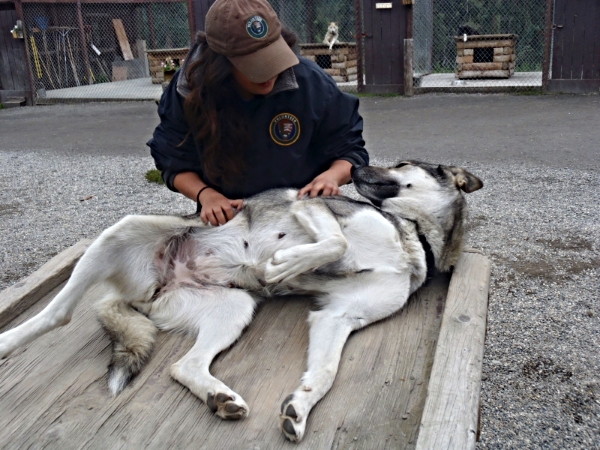
A kennels volunteer rubs pregnant Sylvie's growing belly. (NPS photo)
When our litter of pups is born in August, the next task will be for the dogs and humans to work together to start shaping them into hard-working, command-following, creek-crossing, trail-breaking Wilderness protectors. We ask a lot of our canine coworkers out on the trail, and we rely heavily on good training and lots of positive reinforcement to keep them motivated and having fun. We start that training when they are about three days old. At that age, the puppies will find themselves lying on their backs with toes tickled by q-tips in the arms of the kennels staff. We'll tuck them into our jackets next to our heartbeats to keep them warm and get them accustomed to being held and to our smells. A few weeks later, we open the puppy pen up to volunteer dog walkers who may come in for snuggles. Then the fun really begins as other park employees and some lucky visitors help us socialize the pups to all the different people they will meet over the course of their careers here. The pups run and play with visitors in the sled room. They make the big journey to the Headquarters offices. They run free in the dog yard in the mornings to play with all the adult dogs. It might not sound like training, but it is a very important part of puppy development. We get 50,000 visitors coming into the kennels in the summer time, and these puppies are going to need to be very comfortable around lots of people in lots of different situations.
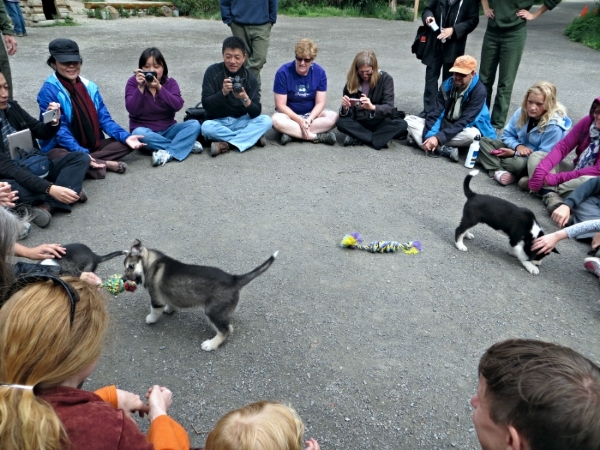
Puppies Clove, Munter, and Prusik play with park visitors. (NPS photo)
Being accustomed to people is incredibly important in our kennels. So is listening to and following commands from the staff. Kennels staff makes a huge effort in bonding with the puppies while they're young to establish a foundation of trust. The puppies need to learn that following our commands leads to positive experiences. The best tools to teach them that while their young? Kibble, toys, and treats! The first command we teach the puppies is to come. With a bowl full of kibble in hand, we have them chase us around their house a few times before they get the kibble reward. Once they understand that when they get to us they receive a reward, we can tag on a verbal cue to call them to us. When the puppies are larger, we'll increase the run length and have them follow us around our summer demo track while we call the command to come, and when we all bound into the puppy pen, their dinner is waiting right there for them. When they're older yet we'll take them on walks to explore the taiga, to see all the exciting things they'll see out on the real trail. They'll gallivant through blueberries and parade around with heaps of moss in their mouths, tackling each other through creeks and chasing each other's tails over and under logs. We call them over to us, and when they come back we feed them a plethora of cookies. Romping around the forest is fun, but coming to us when we call is, too! This is an example of positive reinforcement, which is a means of training that reinforces good behavior with something that is desirable to the dog (in this case, cookies).
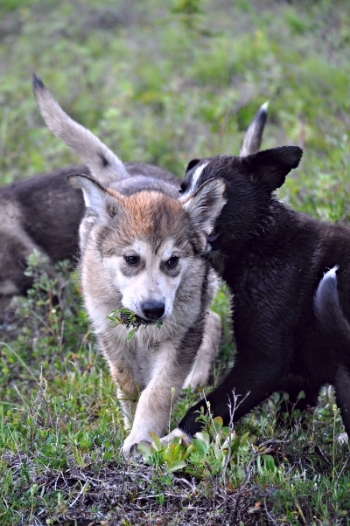
Puppies Polly, Annie, and Lucky romp and play in the tundra. (NPS photo)
Clicker training uses positive reinforcement methods and is a widespread tactic used to train animals. We utilize this form of training at the kennels with our puppies. A staff member will work with a puppy and use "classical conditioning" to associate the clicker with treats (think Pavlov's dogs!). Once the puppy associates the clicker with a treat, the clicker is used to shape behaviors. We like the clicker because it is a consistent and recognizable sound for the dog as opposed to the human voice which can constantly change in tone, inflection, and therefore, meaning for the dog. We click to mark the height of a desired behavior, when the puppy is doing exactly what is wanted. Marking that behavior and then reinforcing it with a treat teaches the animal that it has control over whether or not it receives a treat. This is called "operant conditioning". We use operant conditioning to teach our puppies to sit, come, and jump on their houses. Once a dog is operant, you can train it to do anything as long as the dog is physically capable and you have the patience to teach a behavior.
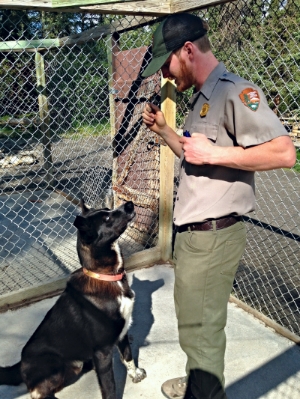
Lucky brushes up on clicker training with one of our Rangers. (NPS photo)
When you're standing on the runners and your lead dog is 8 dogs ahead of your sled- it can be a little tricky to reliably use clicker training. Luckily, and anyone who has seen a sled dog pull a sled can vouch for me, running and pulling is just as reinforcing to these dogs as treats are. In winter we depend on our older, more experienced dogs to train our dogs as equally as we depend on our human staff. From the very first time we put a puppy in harness, it's standing right next to an adult dog who will teach them that the harness means business. From skijoring next to Uncle Skeeter, to running loose next to the big dogs on a 100 mile trip out to Wonder Lake—the puppies learn that a harness is a symbol for both work and fun. If a loose puppy gets a little too mouthy and romp-y into the path of our leaders, a quick nip or growl from an adult is all it takes to teach that there is a time for work and a time for play. The puppies see the rhythm that takes over a team, and at a critical point in their development, they even realize that it's more fun to work with the pack and run in team with the big dogs than it is to run loose beside them. Each puppy goes through a rite of passage that each of our adult dogs has gone through at some point in their own life, too. After a few fun runs with light loads and short distances, the puppies understand the concept of pulling a sled.
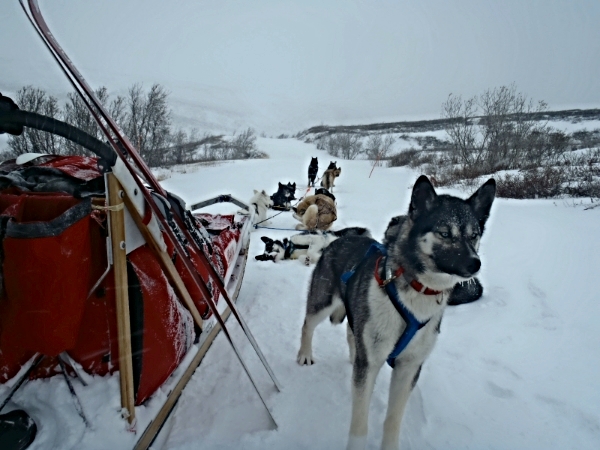
Puppy Clove stands next to the sled on her first trip to Wonder Lake. (NPS photo)
We never over exert the puppies their first winter. That first winter is a time for learning, playing, and experiencing the magic that their new world has to offer. We casually boast to our summer visitors that these are the happiest federal employees they will ever meet, and each new litter of puppies that we bring into this world proves that time and time again. Each year, the litter of puppies that we breed replaces the tried and true dogs that have worked hard to serve this park. We give our retired dogs peaceful and loving homes for them to tell the stories that they have acquired over years on the trail, making room for new puppies to continue on a legacy and path mapped out for them to accomplish the hundred year old goal set in place by their ancestors to preserve this park.
We will keep you all updated with the birth of our next generation of canine rangers in case you feel so inclined to visit the kennels and give them a pup talk for the tremendous journeys they will soon be trained to undertake!
